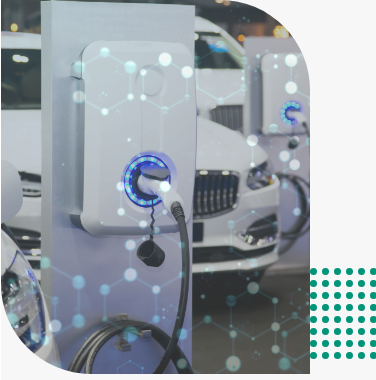Sealing the Future: Silicone Foam in the Electric Vehicle Industry
Passenger vehicles and lightweight trucks are essential for the mobility of Americans. As individuals, businesses and governments seek ways to reduce carbon emissions, electric vehicles are paving an electrified future for roadways. With more than half of US car sales projected to be electric vehicles by 2030, manufacturers and designers will need supply partners with innovative and effective solutions.
The electrification of roadways reaches around the world. Globally, electric vehicle sales have increased steadily accounting for more than 14% of vehicles sold in 2022. Consumer demand, private investment, government incentives and evolving technology all promise this number will exponentially increase in the coming years.
There are many advantages to electric vehicles compared to conventional combustion engine automobiles. The explosive growth expected within the next decade is driven by one key benefit: cleaner air quality. Overall, transportation accounts for the most greenhouse gas emissions in the United States annually. While early adopters and environmentally concerned motorists are eager to go electric, there are still obstacles facing the EV industry. EV range anxiety, performance and reliability remain top of mind with many consumers. Price has been a barrier but with increased competition and government incentives, more affordable electric vehicles are emerging every year.
Overcoming Obstacles
To reduce range anxiety, manufacturers continue to innovate vehicles, motors and batteries to maximize the range of a single charge. With more than 16 government-funded studies focusing on electric vehicles and charging infrastructure, experts understand the need to optimize all components within electric vehicles and provide charging stations to keep electric vehicles moving.
To optimize performance and reliability, EV OEMs and Tier 1 suppliers partner with innovative companies like Polymer Science. For decades, our team has developed and engineered a wide range of materials for many industries. Our P-SHIELD® Shielding & Grounding materials effectively manage EMI throughout the vehicle and within devices like infotainment and displays. P-THERM® Thermal Management materials include gap fillers, two-part dispensables and other materials for heat dissipation. Our general industrial products include tapes, coatings and adhesives used throughout many industries.
Many of these products are already improving the quality and performance of electric vehicles. One example is the remarkable number of applications for silicone foam. The versatility, quality and durability of this material can be used for sealing and gasketing in electric vehicles and EV charging stations.
Applications of Silicone Foams in EV
As within the traditional automotive industry, silicone foams are used for sealing and gasketing in electric vehicle lighting systems, displays, sensors, doors and windows. Polymer Science works with Tier 1 suppliers and OEMs on a number of EV-specific applications for EV batteries.
Sealing of EV Battery Pack Housing
The integrity of batteries is essential to electric vehicles. The battery pack must be sealed against weather, moisture, dirt and other contaminants. The battery pack must also dampen the vibration created by operations and roadway conditions.
Silicone foams properly seal the battery housing the low compression set properties and maintain a consistent seal over time. Silicone foam is hydrophobic and durable against environmental elements including chemicals, UV, ozone and biological growth like mold.
Beyond sealing the battery pack housing, silicone foams are extremely lightweight aiding in the performance of electric vehicles.
A third advantage of silicone foam is resilience. The properties of silicone foam allow maintenance of the EV battery pack housing. The housing can be opened, serviced and closed without replacing the seal.
Protecting Battery Cells
Within the battery pack, thousands of individual battery cells need proper separation and vibration dampening. Silicone foam is a thin and lightweight material that accomplishes both objectives.
Silicone foam creates a cushioning and vibration-dampening layer reducing wear and potential damage to cells. Silicone foam also provides heat dissipation which can improve the overall performance and service life of each cell.
Battery cells can swell and contract during charging cycles. Silicone foam’s resilience and durability make it an ideal material for maintaining cell separation and mitigating the impact of vibrations within the battery pack.
Cushioning for Module
Silicone foams deliver consistent pressure at the battery cell level and as a cushioning for the module provide an even pressure distribution. Silicone foam reduces weight, mitigates thermal runaway and provides protection from moisture and debris.
The versatility to seal and protect sensitive battery packs, EV modules and individual cells is just one example of how Polymer Science aids the electric vehicle industry.
Electric Vehicle Charging
Beyond the vehicle, the support equipment for EVs, specifically charging stations, will be located across many climates. Outdoor electric vehicle charging must perform in rain, snow, extreme cold, arid and dusty conditions. Sealing the charging pile and charging guns will ensure the necessary infrastructure is in place for end users.
Sealing for Charging Pile
Sealing for the charging station or charging pile protects all of the electrical components and connections within the system. Silicone foam provides superior weather resistance and durability for EV charging piles. Safeguarding against moisture ingress, dust accumulation and other environmental factors is key to long-term durability of these systems.
Silicone foam resilience allows for maintenance and potential repair of the charging station. The majority of these stations are constructed with a metal frame shrouded in a housing. Silicone foam retains a seal and consistent pressure to ensure sensitive components are protected, extending the service life and potentially reducing repairs to charging infrastructure.
Sealing for Charging Guns
Silicone foams protect electronics within the charging station and offer a quality sealing material for charging guns or loading guns. A secure connection improves charging time and prevents moisture, dust and other debris from obstructing the connection.
Key properties of silicone foams for use with loading guns include flexibility over large temperature ranges, resistance to UV radiation and maintain superb flexibility over a large temperature range, form watertight seals and dielectric properties. All these advantages make silicone foams an ideal option for sealing charging guns.
Working With Polymer Science
In the domain of EV vehicles and charging, silicone foam provides benefits for sealing and gasketing throughout the vehicle and charging stations. Polymer Science offers a wide range of silicone foams as well as other materials. Our ability to fulfill the exact needs of OEMs and Tier 1 suppliers is helping to herald a new generation of passenger vehicles within the US and globally. Contact our team for more information including samples and customer solutions.


